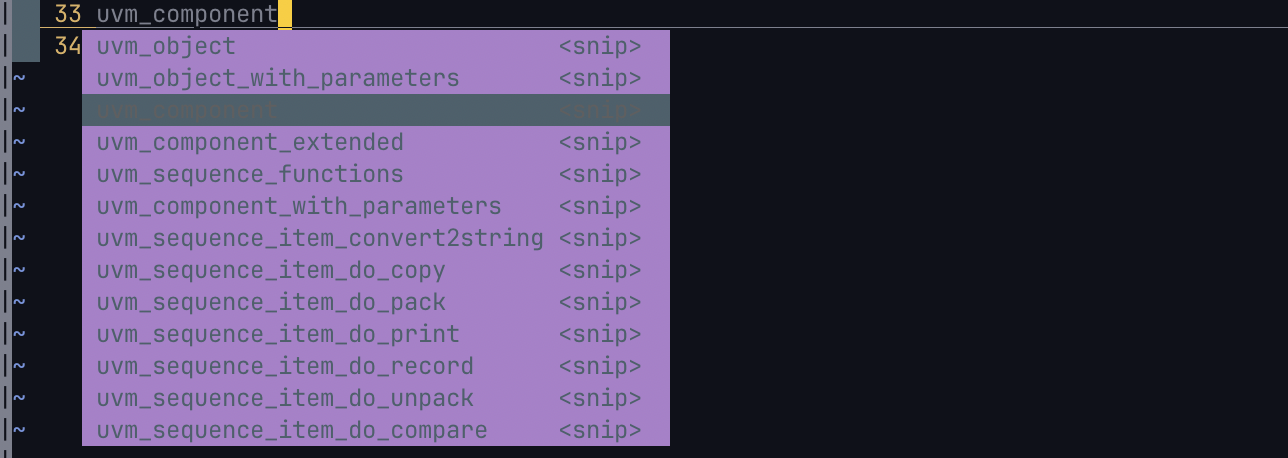Vim UVM Snippets
This article outlines the process of adding UVM snippets to the vim-snippet GitHub repository.
Introduction
Background
Vim snippets auto-completion is commonly facilitated by two plugins: UltiSnips and vim-snippets. Currently, there is no support for UVM snippets inside the vim-snippets repository. However, another VS Code plugin, SystemVerilog-1800-2012, provides useful UVM snippets, although it hasn’t been updated for more than 2 years.
Target
This article guides you through the process of migrating UVM snippets from the VS Code plugin to the vim-snippets repository, enabling their use within Vim through the UltiSnips plugin.
Process
While both UltiSnips and snipMate formats are supported, vim-snippets suggests using snipMate for its wider adoption. Additionally, there are bug-related issues with the ‘`’ escape character in the UltiSnips format. Given the wide use of this character in UVM macros, we ultimately opted for the snipMate format.
VS Code Plugin Snippets
Fetch the snippets code from here, and then replace \n\n$0 with $0\n\n to avoid the format error. snipMate requires extra tabs at the beginning of $0. Otherwise, the following conversion step would not be able to do so.
Snippet Format Conversion
An example of converting uvm_container.json into uvm_container.snippet is shown below.
import json
json_file = './uvm_container.json'
output_file = './uvm_container.snippet'
with open(json_file,'r') as load_f:
decoded_hand = json.load(load_f)
load_f.close()
with open(output_file,'w') as output_f:
for key in decoded_hand.keys():
body = decoded_hand[key]["body"]
prefix = decoded_hand[key]["prefix"]
output_f.write('snippet ')
output_f.write(prefix+'\n\t')
body = "\n\t".join(body)
output_f.write(body)
output_f.write('\n\n')
output_f.close()
Below is the first class snippet.
snippet uvm_object
// Class: $1
//
class ${1:$TM_FILENAME_BASE} extends ${2:uvm_object};
`uvm_object_utils($1);
// Group: Variables
// Group: Constraints
// Group: Functions
// Constructor: new
function new(string name = "$1");
super.new(name);
endfunction: new
$0
endclass: $1
Before adding it to the file under the vim plugin vim-snippet/snippets/systemverilog.snippet, two additional steps need to be taken care of:
- Replace
$TM_FILENAME_BASEwith a default class name, such asmy_class. - Replace `uvm_* with \`uvm_*, as the ` symbol is used to trigger the shell code, and it should be used with an escape character.
Now that we have the completed snippets for uvm_container, append them to the end of systemverilog.snippet. Afterward, open a .sv file in Vim to test their functionality.

Github Pull Request
A pull request is opened to merge the changes into the vim-snippet repository.
TODO
- Refine the UVM snippets, addressing any inclusion of unwanted methods in certain class snippets.
- Add missing class snippets, such as
uvm_driver,uvm_monitor, etc. Presently, only basicuvm_objectanduvm_componentrelated class snippets are supported. - Repeat similar process for
uvm_macrosanduvm_phasesnippets provided by the original VS Code Plugin.
Leave a comment